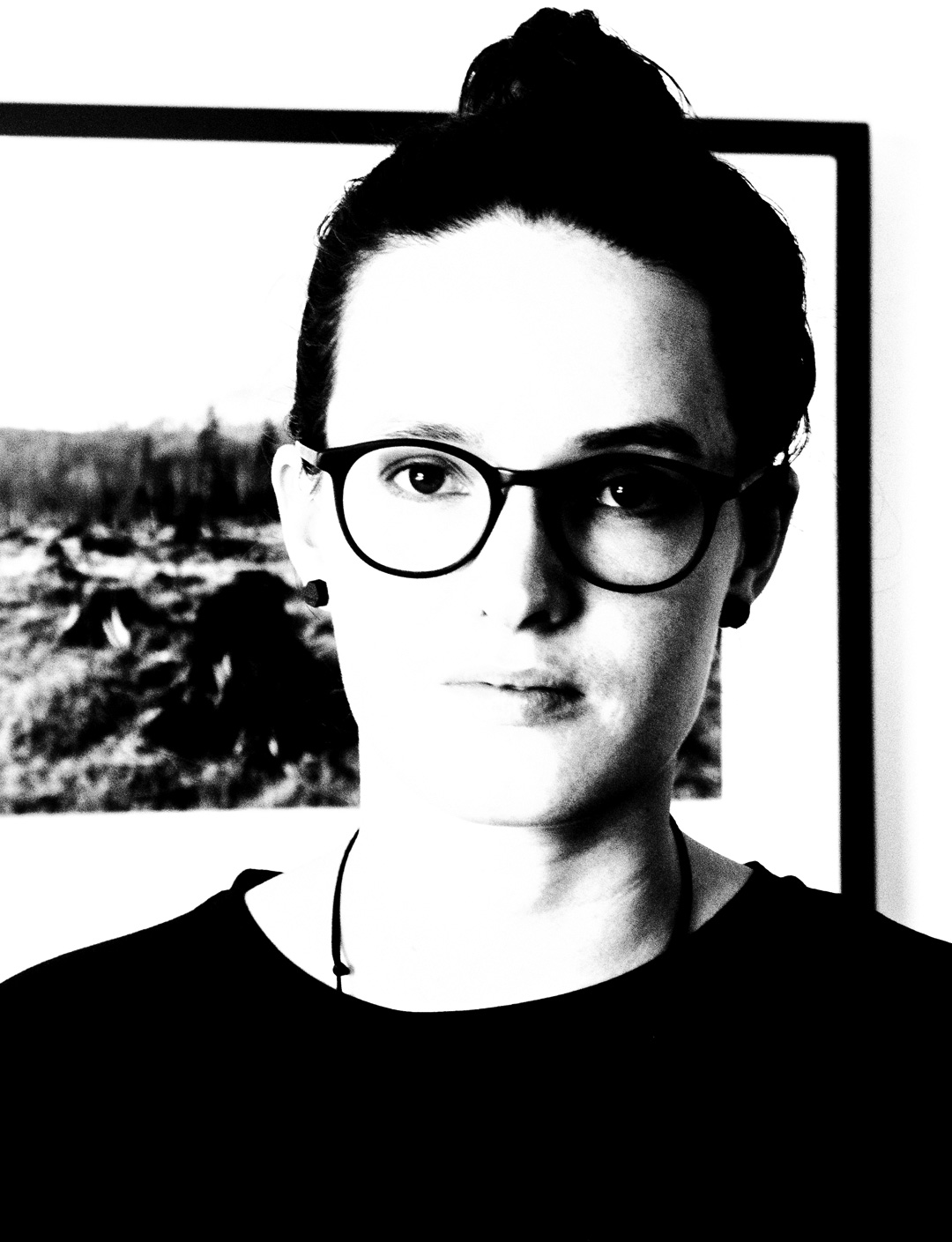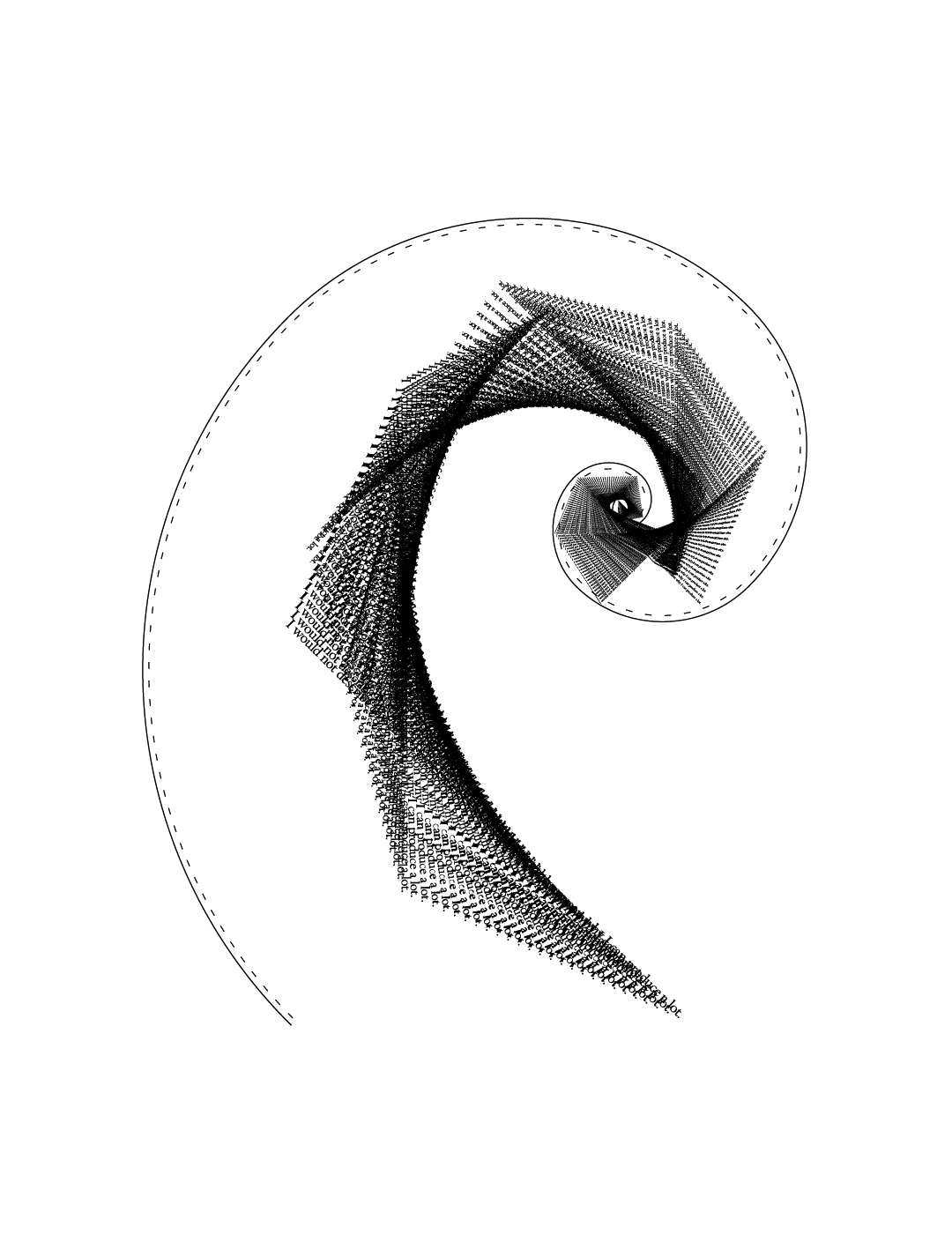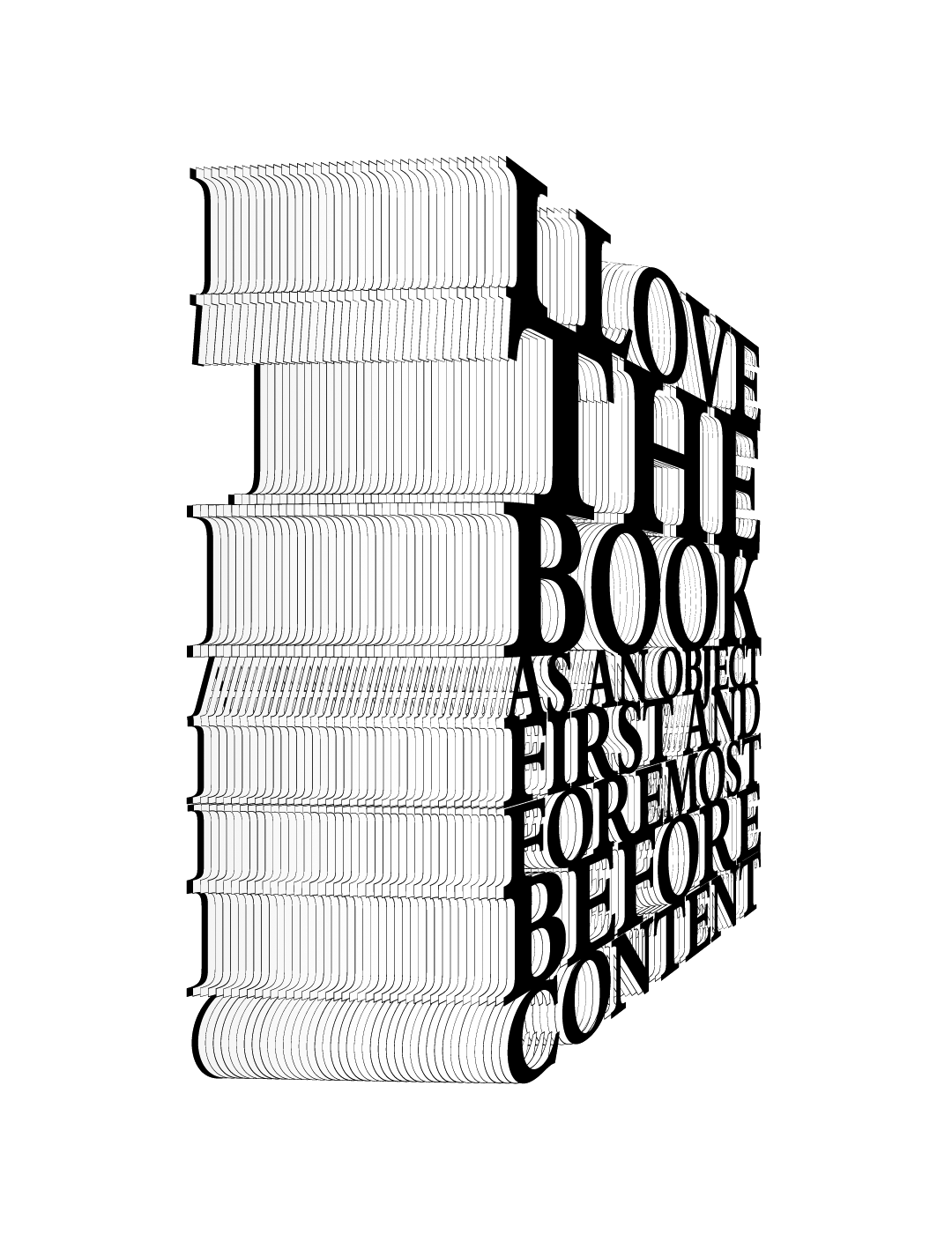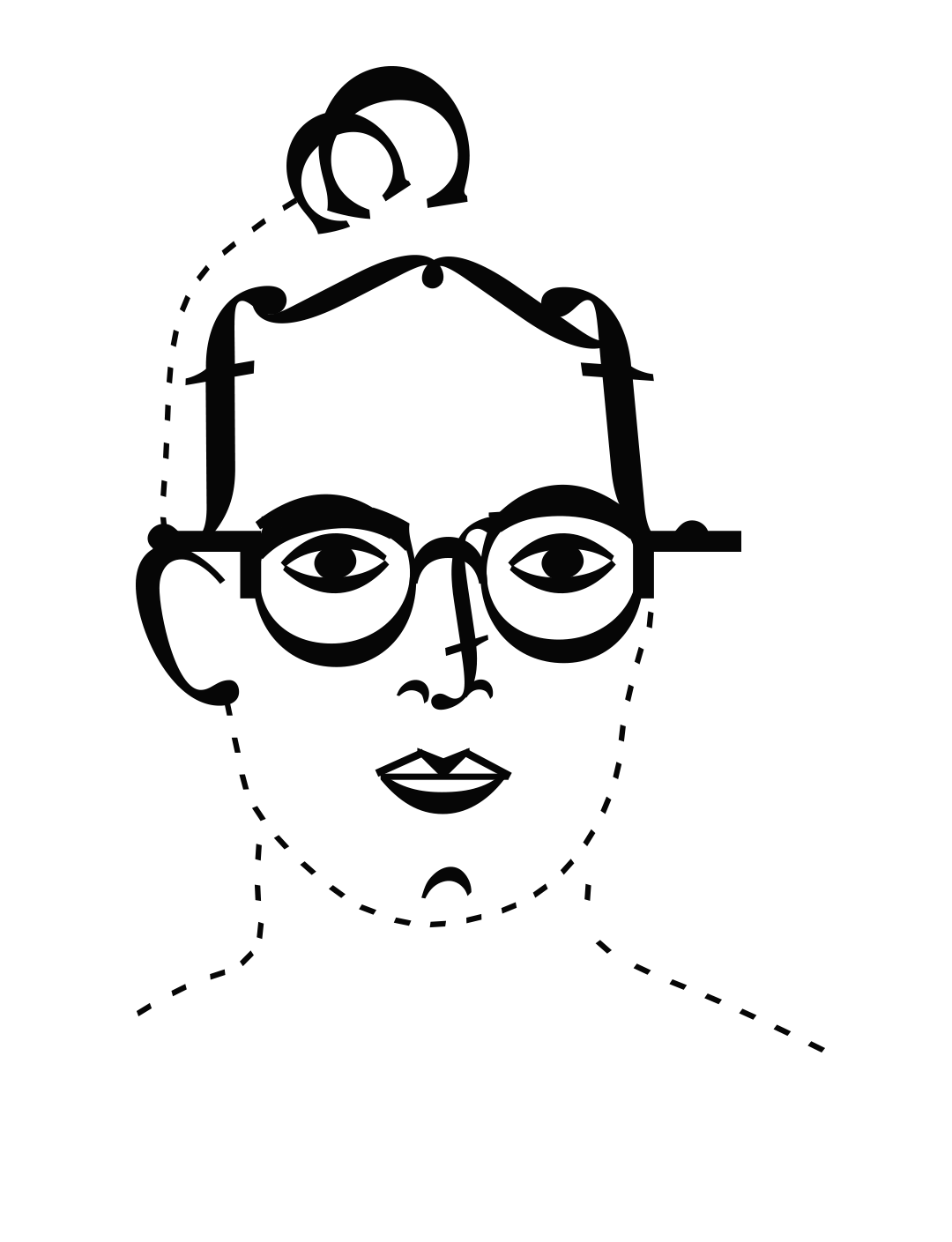Chloe Ferres--- 8 April 2017
By Lorenzo Princi
You have a unique lifestyle, how would you describe what you do?
I’ll have a go, I was dreading that question. I knew it was going to be the first one. I sometimes take photos, I sometimes design things, I try to have fun doing it. I teach to make money and-- so I can travel, whenever possible, wherever possible and I guess, books; that’s where photography and design come together.
"There are a whole lot of people realising that they don’t like to live in the world exactly as it is."

You're very much a do’er. Photography, design, book-making, collaborating, going to events. Why do you think it’s important for creative people to not just diversify their skills but actually produce prolifically?
I think it’s just my nature to be prolific and that’s why I produce so much. I’d also say an important thing for creatives might be-- not to be perfectionist. I would not describe myself as a perfectionists and I think that’s the reason why I can produce a lot. If I was unhappy with the finished product or I nitpicked over everything, it wouldn’t happen. I wouldn’t make anything.
"I would not describe myself as a perfectionist and I think that’s the reason why I can produce a lot."

Where did your passion for photography come from and how does it fit in now?
Yeah, I think the photography goes back into my family. My dad took pictures all the time and was a relentless documenter of our lives growing up-- my sister and I. He also kept family photo albums really-- really religiously almost. Every single trip, every single year. All chronological, extra bits and pieces like tickets or postcards or other things would make it in there as well to tell the story. So, he took pictures of everything all the time whether we liked it or not [laughs]. Whether they were flattering pictures or not so I think I just grew up with photography as part of my life and something that just happened. It wasn’t a question of whether or not you take photos and my-- I’ve got aunts who have been interested in photography, I’ve got cousins that are interested in photography, I-- grandparents that carried a camera everywhere so I think it’s just always been there.
How did you find doing photography commercially?
Yeah, when I started out, I started out studying and I definitely-- the goal was definitely to work as a photographer and I think when I did that I realised that it didn’t always mean that I got to make the images that I wanted to make. Sometimes I did get to take pictures that I was happy with but for the most part when you’re working as a photographer or even when you’re working as a graphic designer, you’re doing things that someone else says you have to do, someone else is coming up with the ideas, someone else is overseeing a final product and you’re just creating a small part and you don’t necessarily have a big say.
So I-- I no longer aspire to work in-- either as a photographer or as a graphic designer full time. When opportunities come up I’ll take them but I’ll also be very selective and that was a good piece of advice that one of my early photography mentors gave me, to be picky, so you don’t get stuck doing things that you don’t want to do and I’m lucky I guess to have a job that is related to photography but lets-- you know, doesn’t mean that I’m working as a photographer, let’s me pay the bills, so I can afford to be picky.
"I realised that it didn’t always mean that I got to make the images that I wanted to make."

You're also a teacher. How did you get into education and how do you enjoy being on the teaching side of the system?
That was an accident [laughs] I guess, like photographers, there’s quite a lot of teachers in my family and it was something I actually never wanted to do. It was-- my grandmother was a teacher, my mum is a teacher, my sister is a teacher [laughs]. Even my brother-in-law and sister-in-law are teachers. It wasn’t something that I wanted to do but my boss Sarah went and lived in Italy for six months and she-- I was looking after the photography studios at a college and while she was away I got stuck and I couldn’t find anyone to teach a particular subject and she was in Italy and I’m here and she sends a list of people and I’ve been through all the people already and she said just casually, “oh, I thought you could do it” and then I thought, “well, actually, you know what? It starts on Monday and I’ve got no one else. I don’t have a choice, I have to do it.” And that’s how I got into teaching.
Lorenzo: How are you finding it since then?
Yeah, I really like it, I think it’s really rewarding. I think it’s never boring, always challenging as well-- makes me work harder and think differently and always try to be a step ahead because you never know what to expect. And, it also-- it also has reinforced the fact that no one has all the answers, I’m never going to have all the answers, no one that taught me had all the answers and it’s everyone’s own responsibility to learn for themselves whatever they want to find out.
"No one has all the answers, I’m never going to have all the answers, no one that taught me had all the answers."

How has the advent of digital affecting teaching photography?
I think it definitely depends where you study. I think, yes, obviously digital has changed things but it’s just the current tool you have to learn, the current process you have to learn but it’s also made everything you need to know accessible. If you want to learn how to do anything, you know, we can just type it into Google and so I think the standards are now higher because you don’t need to go to university to be a photographer or even-- to almost be anything you don’t need to go to uni, you could teach yourself if you’ve got the discipline and students coming in now know so much more than students did even five years ago and I think there’s probably more of them as well so-- because everyone can pick up a digital camera, everyone has a camera in their phone. Even kids at school, they decide early on, they go, “actually, I like doing this, it’s fun, it’s easy, I’m going to be a photographer or even, I’m going to call myself a photographer before I’ve even picked up a camera” so in that way there’s more competition if you want to do it as a career.
Lorenzo: I guess it was easier in the past to differentiate the difference between family photos, an enthusiast and then a professional photographer but it’s become somewhat blurrier now as things become a lot more accessible?
Yeah and the other thing that’s blurry and it’s one of the things that I’m going to be researching-- trying to research at the moment is the-- why people take pictures-- so many people take pictures just as means of communication. I do it, but historically photography was always there to record a moment and now we’re taking photos not of things or moments we want to keep or remember. So, I guess one of the challenges going forward might be, you know, how do we decide what we want to keep and how do we make sure that we have it in the future and we don’t, you know, discard it all.
Lorenzo: In a world where literally there are cameras everywhere and everything is recorded it’s almost the opposite, what do you not want recorded?
Well, yeah because then, well even-- not just photography but just information. There’s so much of it-- it’s-- we might have it all but is there value in having it all or you know, who’s going to sort through it and pick out what actually gets preserved or if we do have it all, who’s going to have time to look at it all?
"Historically photography was always there to record a moment and now we’re taking photos not of things or moments we want to keep or remember."

Yes! Speaking of information and a lot of it, you’ve a very avid student and have been studying pretty much continuously through your career? Why do you find it important to study even though you have firmly established yourself?
I don’t know why it’s important [laughs]. It is definitely a privilege. I, you know, have almost been studying continuously since I left school. The funny thing is at school I was not a brilliant student, I hated school, I wanted you know-- thought about dropping out early but it was because I just wasn’t getting the chance explore what I wanted to explore, so I think that’s probably the important thing-- Is actually enjoying it, I guess so many people don’t know what they want to do when they leave school, I-- I didn’t know what I wanted to do and I just went, “oh, I’ll just do design or something that’s quite open and work it out later” but then ended up doing photography.
I picked up graphic design because I thought it would help improve my photography career and then those came together and somehow I discovered book making and although I left art school early on when I realised, “this isn’t the environment for me.” I think in some ways my ideal career is that of an artist and just getting to make and create work, so now the degree I’m doing is actually a creative research degree, so it’s half research, half creative projects. So, I guess it's bringing study and my artistic practice together but hopefully in a way that also opens doors for my career.
Your book projects are very popular and your passion for print is obvious, a medium which has been resurrected in a way due to services such as Blurb which you champion. What are your thoughts on print’s new age?
I think there’s definitely a resurgence towards tactile media and also analogue traditions and I think it’s because we now have so much exposure to screens and that relationship is through a piece of glass and it’s quite different. So, I think in living our lives on a screen we’ve lost innate human-- or we’ve lost innate connections even just from materials and from working with our hands-- even not necessarily as a labourer or someone’s who’s been paid to work with their hands but just from the way we do things. Even appliances, you know if I just click a button and my coffee comes out, it’s quite different to going through the manual stages which for me, in the morning; put the water in the kettle, put the stove on, not putting an electric kettle on, grinding the beans, pouring them in, pouring the water over it so when it’s ready-- and really trying to simplify things because I guess as well in that resurgence to print and other things that you know, might not be as efficient, there’s like a slow living movement-- it’s a bit of a buzzword as well but there are a whole lot of people realising that they don’t like to live in the world exactly as it is.
Lorenzo: So it’s very-- objects are becoming two dimensional in a way so it’s not necessarily books or print that are dead but rather the fast, bulk side of print media that’s been replaced by a faster two dimensional digital medium.
Chloe:Yeah, I think that although, you know, e-readers or devices are so accessible that still a lot of people actually read-- want to read a paper book and it would be different for each person whether it’s because they think it’s easier on the eyes or because they like to hold something in their hands. I personally like to read real books because I like to own them and I’ve read-- I’ve read an e-book and not really been satisfied at the end because I’ve thought, “oh, I actually really like that book-- really want to put it on my shelf and save it for later but it’s not really there, doesn’t exist” and I personally got back into reading because I saw so many great book cover designs because if we are choosing to buy books and if-- it’s-- I guess they have to be more desirable than they once were. We’re not just buying them to read because we could read a PDF but a lot more work I think is going into cover design and things like that so yeah I do buy books for their covers and I realised if I wanted to buy books for their covers I probably needed to read them as well [laughs].
"In living our lives on a screen we’ve lost innate human connections."

Social Media has changed the way people can find and interact with an audience. Your Instagram has over forty-thousand followers. Does that come with some sort of pressure? Does it change the way you post? Do you feel it’s important to engage in the social media conversation as a creative professional?
No, it might be different for people that have built up their audiences over a long time. I was-- I don’t want to say fortunate because I’m not sure that it was [laughs] fortune. I was featured as an Instagram suggested user a few years ago and that’s what spiked my followers and I don’t know that most of those people, that initially went, “oh, that’s cool” still even use Instagram. So, I don’t think it’s changed the way I work and the other thing for me is Instagram was never about sharing my photography. Instagram was I guess almost a creative journal, documenting interesting things that I saw but it wasn’t for the sake of photography. So, when I-- when I was featured I was actually travelling and so I was sharing things like; pictures of bookshelves in bookstores, pictures of other amazing shops, design-- probably more design driven aesthetics that appealed to me.
So, I won’t share pictures that I take on a camera other than my phone on Instagram because I value my-- I’ll say, my other photography too highly. I don’t want to subject it to the-- I think the word-- critique because I know that if I put up a photo of book shelves it’s going to get X number of likes but if I put up an image that I shot when I was travelling in Africa, that I’m really in love with, other people may not want to see it and yeah, so I don’t think it’s changed-- I don’t think it’s changed my photography and I have definitely endeavoured to keep it separate and also I have endeavoured not to cater to the followers or the audience because in the end, it’s for me. I take the pictures on my phone for me, I-- yeah, just like I make books for me, I take photos for me, yeah, Instagram is also for me and when it’s not, which maybe it’s getting to that point I’ll just stop sharing.
You’re a very experimental designer. Your books for instance utilise the bound paper as a three dimensional object rather than a series of two dimensional layouts. You also embrace a bit of mess, allowing your books to be torn and cut to reveal their true selves. Where does this sideways look stem from?
It’s hard to say, my mum is definitely a big creative influence in my life, encouraging me to experiment and to do crazy things. That said, she’s actually a teacher/librarian and she always said, “no, don’t leave your book open upside down, don’t fold the corners of your book, don’t write in a book.” Though I don’t think she ever had to tell me that one, I just assumed that last one [laughs] but I do love the materiality of the book and I love the book as an object first and foremost before content, before information, before story. And, I love to fold down the corner of a page and I imagine that in five years, ten years I’ll come back and think, “oh, what made me fold down the corner of that page?”
I love writing my name and the date in the front of books, so I know when I read it, underlining things that appeal to me, even to some extent as well I’m not too precious if things get torn or damaged because I think that’s almost adding to the story of the object, so with my book design I think they’ve only come out of the fact that-- or the frustration that I couldn’t create exactly what I wanted using print on-demand, you know there are beautiful, custom, bespoke book services but that’s not a viable way to design books and you know order more that one copy. Or even to design books prolifically, so in working with print on-demand I-- I guess I just tried to make the most of what I had and whether that was imagining some how that I could change the object or imagining somehow that whoever gets it has to cut it, fold it to make it unique. I think it was just purely working within the limitations that resulted in-- yeah, things that are cut or torn or folded.
"I love the book as an object first and foremost before content."

You’ve collaborated with photographers on some unique projects, do you enjoy that and how does the collaborative dynamic change your approach?
Yeah, I do enjoy collaborative projects but I-- it’s a situation where you definitely have to choose the people you’re working with. I’ve been fortunate in my recent collaborations to be given a lot of freedom or to almost be asked for something crazy which did push me. So, probably the Magic City books that I worked on wouldn’t have existed if it wasn’t a collaboration. When I’m saying, “cut up this book, fold this book.” I'm saying-- I’m talking about the book, whereas, if I put my own photographs in there, I wouldn’t have been so blasé because I would have a different relationship. I wouldn’t have said cut them up, fold them [laughs] but when you're working with somebody else’s work there is a different relationship and one of the things I had to overcome as a graphic designer was my relationship to photography in general. When I-- when I was a graphic design student I’d treat photos with respect. You know, a photographer has edited them a particular way, they’ve cropped them a particular way and that’s their work. Whereas other people didn’t have that same respect for photos, so, my peers were doing things with images that were really interesting but I couldn’t bring myself to do that to someone else’s work. So, it was sort of definitely a barrier that I had to push through and lucky I did because I guess that’s some of my more interesting work.
You get out and about a lot and also have a passion for travel. How has interacting, not only with other creatives but also experiencing different cultures affecting your outlook on art, design and life in general?
I think-- I think travel just always gives you a better perspective of the world and of course being exposed to various cultures does open up you up to new ways of thinking. I don’t think it’s necessarily directly informed my practice but, yeah, travel is something that always inspires me. When I travel I feel like I have boundless energy as well because all I really want to do is see more, see new things and yeah in some ways I feel like I could travel for ever, endlessly and just, you know, never see it all...
Finally, what’s next? I understand you have enrolled in a creative research degree?
I don’t think that’s what’s next, I guess six months ago I didn’t even know that’s what I’d be doing. I think I’m just trying to take each month as it comes and, yeah, I don’t know. I don’t know what’s next and that’s okay, I’m happy and whatever it is, I’ll try and have fun!







